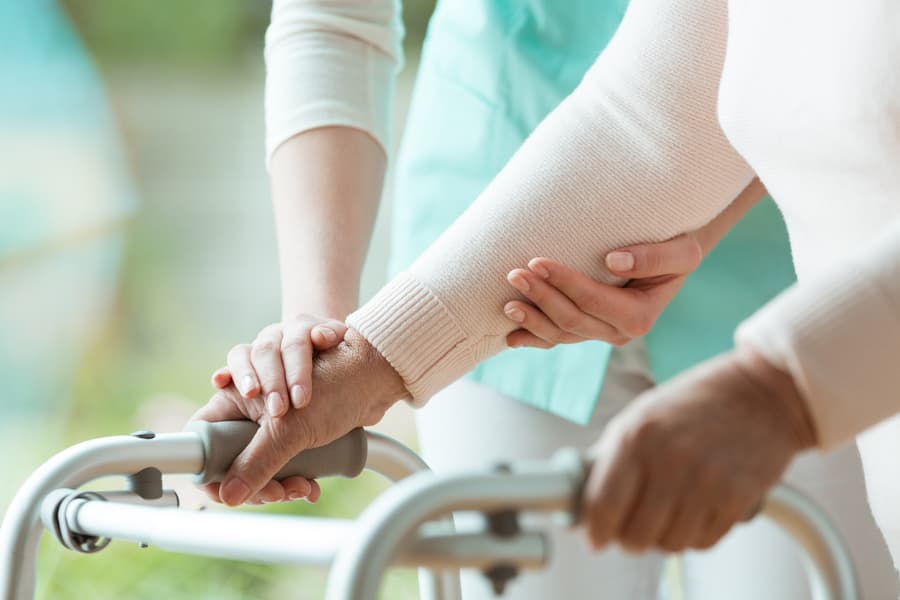Parkinson’s disease is a progressive condition that commonly affects older individuals, with symptoms that can have a widespread impact on an individual’s life. Fortunately, specialized Parkinson’s rehabilitation can help patients preserve their autonomy. At Richmond University Medical Center in Staten Island, NY, neurological rehabilitation plays an important role in our approach. Learn more about what this means and how it can benefit Parkinson’s patients and their family members.
How Does Parkinson’s Disease Affect Patients?
Parkinson’s disease is a progressive neurological disorder that affects the basal ganglia, a group of structures in the brain that are responsible for regulating motor control. As cells in the basal ganglia degrade, symptoms affect the whole body with increasing intensity. Key symptoms include:
- Tremors: Individuals with Parkinson’s often experience resting tremors, or rhythmic shaking of muscles that are not in use.
- Bradykinesia: This term refers to an overall slowing of movements. It often appears as muscle weakness or small, shuffling steps when walking.
- Reduced expressions: Bradykinesia also affects the facial muscles, leading to subtler facial expressions and difficulty emoting.
- Changed posture: Individuals with Parkinson’s may bend forward while standing or walking, creating a stooped or hunched appearance.
- Muscle rigidity: Muscles become stiff or rigid, leading to cramps, jerking or mechanical movements, and decreased facial expressions.
- Balance problems: Slowed motions and muscle rigidity together contribute to balance problems and an increased risk of falls.
- Physiological functions: Patients may lose control over physiological functions, including bowel and bladder control, sexual ability, and swallowing.
- Speech: Reduced control over facial muscles may cause patients to speak unusually quickly, quietly, or with a monotone inflection.
All of these symptoms grow worse over time, leading to disability. Careful management is essential to help individuals stay functional and active, improving their long-term quality of life.
What Is Neurological Rehabilitation?
Neurological rehabilitation is an integral part of Parkinson’s disease management. This multi-disciplinary approach helps patients cope with various neurological disorders. It targets every aspect of a person’s health, including physical, emotional, and social well-being, to help them stay independent and improve their overall quality of life. Rehabilitation programs are fully personalized to meet each person’s unique needs, but they often include:
- Occupational therapy for daily activities like eating, dressing, and bathing
- Speech-language pathology to help with speaking, reading, writing, and swallowing
- Physical therapy to improve mobility, muscle control, and balance
- Activities to improve concentration, attention, and memory
- Bladder and bowel retraining
- Nutritional counseling
- Assistive devices to promote independence
- Safety measures installed around the home
- Emotional therapy for stress, anxiety, and depression caused by disability
- Community support groups with other Parkinson’s patients
- Patient and caregiver education
Rehabilitation can take place in a hospital or on an outpatient basis. Programs are designed and delivered by teams of specialists who collaborate to provide a comprehensive treatment that meets all of an individual’s needs.
How Neurological Rehabilitation Helps Manage Parkinson’s Disease
There are several ways in which neurological rehabilitation helps patients manage Parkinson’s, from educating caregivers to directly preventing brain degeneration. Some of its most powerful benefits include:
Improved Independence
Neurological rehabilitation reduces the impact that Parkinson’s disease symptoms have on a person’s life, either by minimizing their severity or by helping to navigate activities of daily living. This, in turn, helps the person stay as independent as possible. Not only can individuals perform more activities, they also feel more confident in their ability and are less likely to be depressed.
Slowed Disease Progression
If started early, neurological rehabilitation can also slow down the progression of Parkinson’s disease. Rehabilitation combats symptoms, keeping them from worsening. It also strengthens dopamine neurons, preventing the basal ganglia from degenerating further. In other words, it directly combats brain degeneration.
Education of Caregivers
Parkinson’s disease can be tough on family members as well. They may feel stressed or confused when their loved one cannot socialize or participate in their favorite activities in the ways they used to. Neurological rehabilitation educates the family on managing the effects of Parkinson’s. This keeps relationships strong while empowering caregivers to support their loved ones better.
Keeping Physicians Informed
When physicians routinely see patients for rehabilitation appointments, they can keep better track of how the disease progresses. They will have the opportunity to notice any sudden changes in condition, allowing them to adapt their treatment approach or implement an intervention if necessary to keep the patient healthy.
Learn More about Neurological Rehabilitation for Parkinson’s Disease
Parkinson’s symptoms can have a far-reaching effect on a person’s quality of life. Fortunately, neurological rehabilitation can help individuals stay independent. Richmond University Medical Center is located in Staten Island, New York, serving the region with award-winning care. Contact us to learn more about our rehabilitation services for individuals with Parkinson’s or to schedule an appointment.




